Sustainability Talks

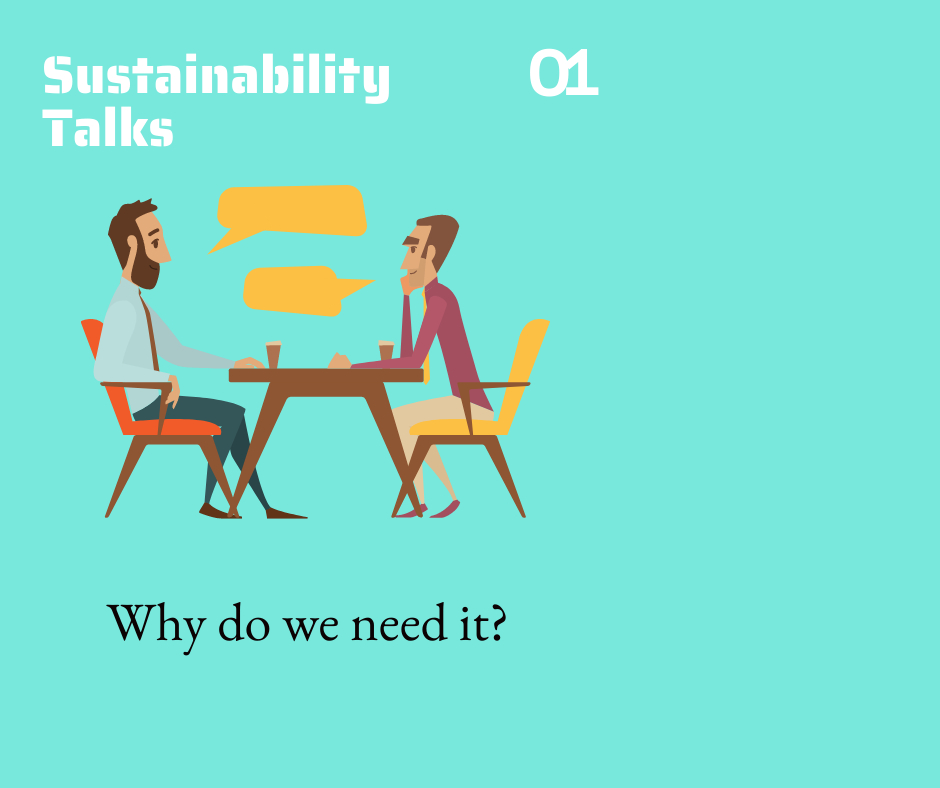
We decided to start talking about Sustainability.
Why do we need it, especially in the difficult times that Ukraine is going through today?
Firstly, we currently lack stability and certainty in our lives and business. And we clearly see that sustainable development is impossible without peace.
Secondly, we are convinced that a sustainable and healthy society and support for war are incompatible things. The numerous acts of military aggression that we are currently observing around the world indicate that a very large part of humanity is still far from accepting the ideology of sustainable development and is not concerned both with human rights and climate change issues.
A paradoxical situation arose. One part of the world is actively working to ensure sustainable development, improve people's quality of life and preserve the environment. The other is not very concerned about these issues. On the contrary, it is more important for the leadership of some countries to demonstrate their power by seizing the territories of neighbouring countries, spread malice and hate between people and use this to consolidate their power. And nothing stops them on this path: neither the destruction of life and suffering of a large number of people, nor the destruction of housing and infrastructure, nor the provoking of environmental disasters. And unfortunately, the majority of citizens of these countries either support or tolerate it.
If this continues, the declared UN Sustainable Development Goals will remain on paper. All the great work to achieve the SDGs will be undermined by those for whom sustainability worth nothing. Therefore, today it is important to focus on how to significantly increase the number of people for whom sustainable thinking and sustainable behaviour are the norm. Let's work on this together.
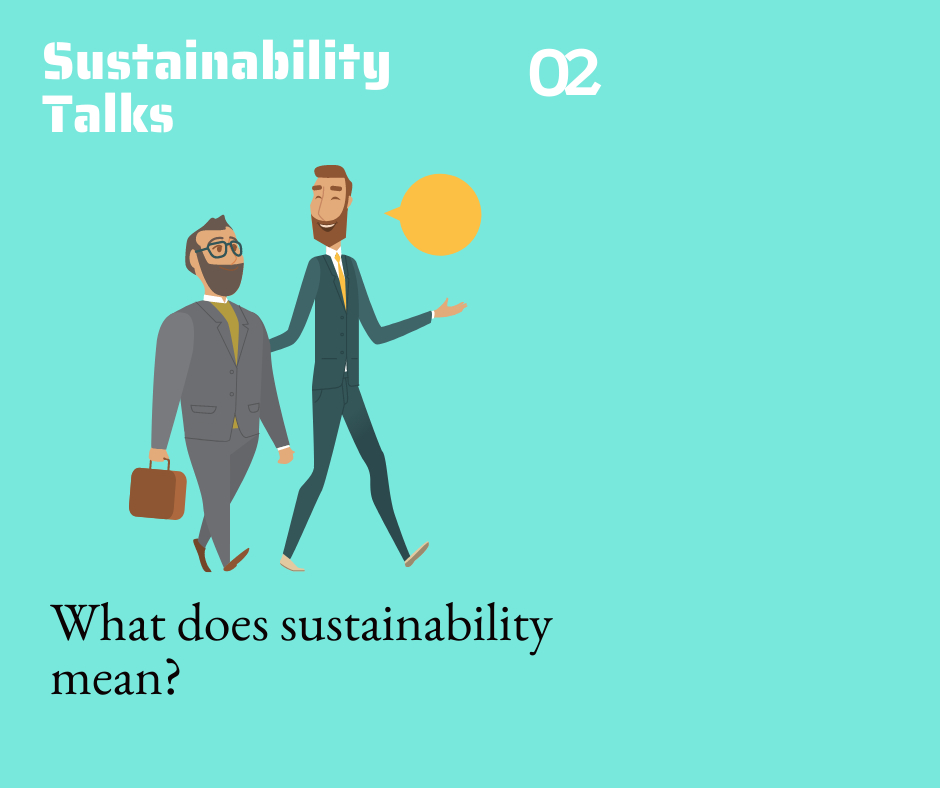
We will consider the concept of "sustainability" in the context of sustainable development.
Sustainable development is defined as economic and social development that meets the needs of the current generation without limiting the possibilities of future generations in the use of resources, or, as academician Nikita Moiseyev noted, "development that is permissible or consistent with the state of nature and its laws."
Sustainable development is not possible without sustainable government policy, sustainable business and sustainable human behavior.
What is their sustainability?
If we talk about government policy, then it is aimed at ensuring a high quality of life of the population: guaranteeing basic human rights, their safety, well-being, a healthy environment, peace and opportunities for self-realization both in the short and medium term, and in the future.
If we are talking about running a business, then it is about the reasonable and careful use of resources (natural and human) in achieving business goals, as well as about a caring attitude towards one's employees and consumers, and about the absence of a negative impact from activities on the environment.
If we are talking about people's behavior, then this is a reasonable sufficiency in the consumption of goods and services, as well as a positive and tolerant attitude towards the environment.
It is people who define and implement government policy, conduct business and simply live on this planet. And it is they, their knowledge, worldview and value system that determine the sustainability of politics, business and society's behavior.
Incorporating sustainability into a person's value system is a long and not a simple process, which must begin with acquiring knowledge on sustainable development and the skills to assess the future impact of one's actions on other people and the environment, not only in the short term, but also in the future.
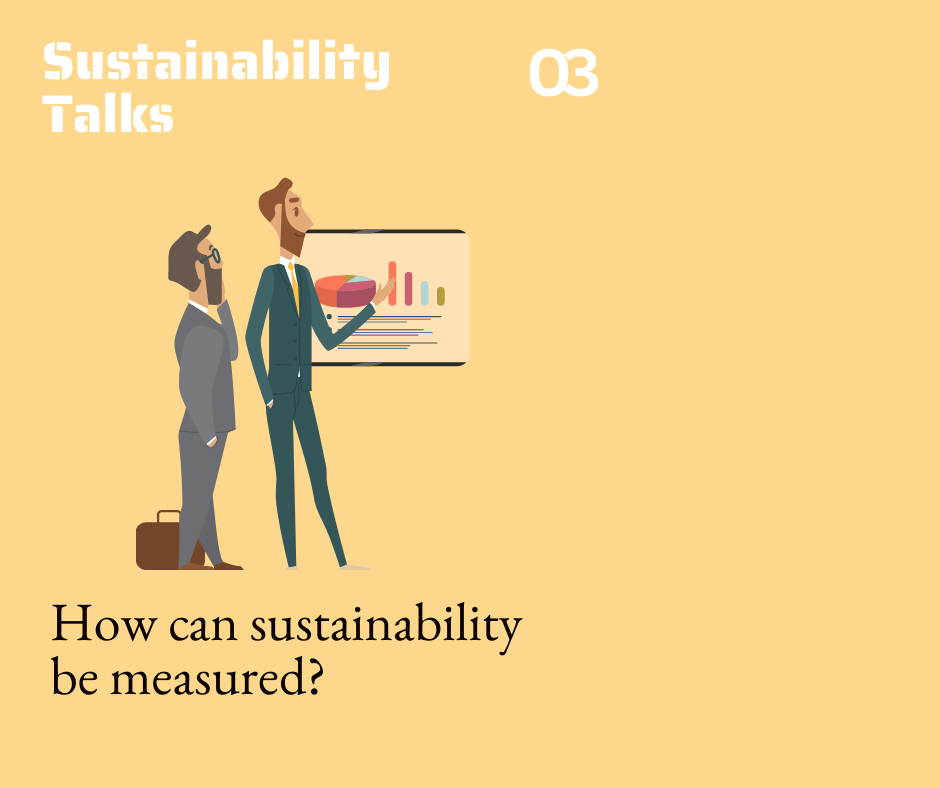
In the world, there are different approaches to defining sustainability and different standards for its measurement. This can be explained by the fact that the movement towards sustainable development took place almost simultaneously at the initiative of various institutions, both from above and from below.
The most popular approaches to measuring the sustainability of policies, strategies, and behavior of state institutions and businesses are determining their compliance with the requirements of the ESG (Environmental, Social and Governance) and SDGs (Sustainable Development Goals). The first approach is more often used in the business environment, the second - for evaluating the activities of public authorities.
The application of ESG involves assessing the impact of activities (the state of affairs in a certain area) from the point of view of its impact on the environment, social issues and management (its quality). The assessment of sustainability in the context of the SDGs involves the assessment of activity (the state of affairs in a certain area) from the point of view of its compliance with indicators of the fulfillment of tasks of the 17 goals of sustainable development, which are quite clearly defined both at the global and national levels. The latter is more suitable for comparison and takes into account the specifics of individual countries.
At the same time, both of these assessments are about the same thing. The 17 SDGs can be grouped into three categories - "People", "Planet" and "Prosperity". These categories correlate very well with the characteristics that are evaluated within ESG - "Environmental with "Planet", "Social" with "People" (People), "Governance” with "Prosperity". Therefore, in principle, the assessment of the sustainability results of a certain activity (the state of affairs in a certain area) can be simultaneously presented both in the form of ESG and in the form of SDGs. But, in our opinion, it is necessary to start with an assessment of compliance with the SDGs, which makes it possible to substantiate the conclusions based on the results of its implementation more clearly and, what is important, in terms that are understandable for society, and which are also well measurable.
The purpose of assessing the sustainability of public authorities and business is clear and does not require detailed explanations. People need to know how effectively public authorities work and how responsible they are in fulfilling their duties to society. As for business, it is an opportunity to understand whether its activities are useful for society in terms of the quality and safety of its goods/services, impact on the environment, proper treatment of consumers and employees, etc.
Sustainability of society is not usually measured, although it is not less important for planning sustainable development activities. At least we have not come across such estimates. If you have such information, we would be grateful if you could link to it.
But does it make sense to evaluate the sustainability of society? In our opinion, yes. After all, as we said earlier, the sustainability of politics and business is determined by the worldview and value system of people, which are manifested in their personal behaviour, the formation and implementation of state policy, as well as in the conduct of business. And it is necessary to start the movement towards sustainable development precisely by strengthening the sustainability of society, which also needs to be measured.
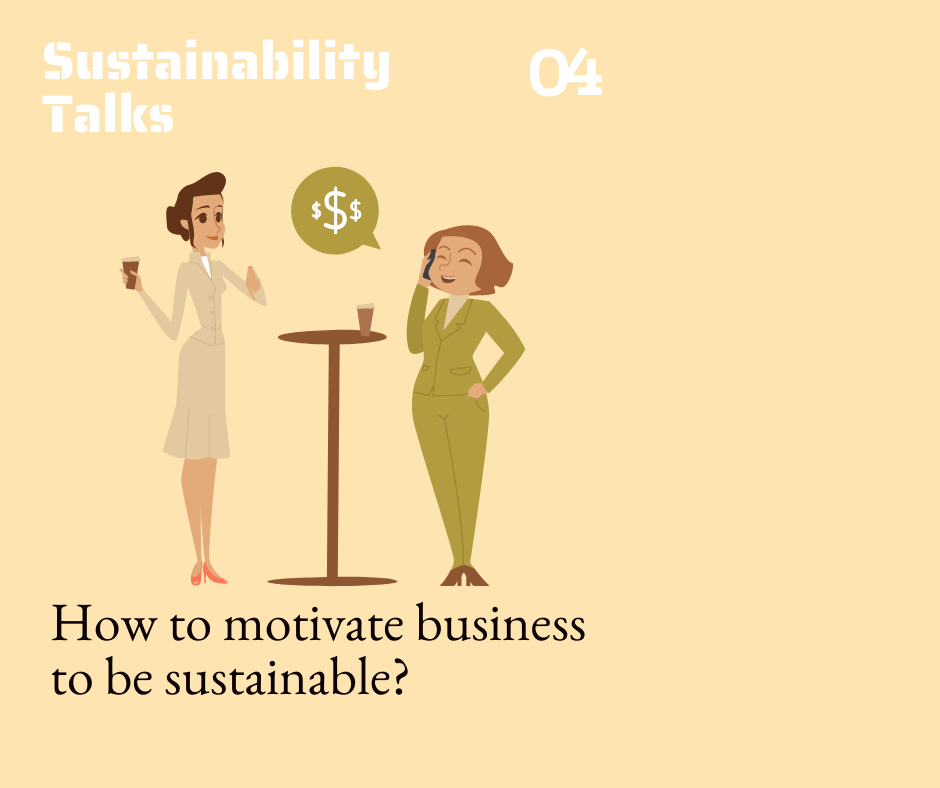
Business plays an essential role in our lives. It provides us with goods, works and services without which we cannot imagine our life. With active participation of business, the infrastructural objects without which one cannot even think about a quality human life are built and operated. It creates jobs and provides prosperity for dedicated and professional people. It is business that is the source of technological and institutional innovations. And all this is extremely useful for society.
At the same time, business activities also have a negative impact on our lives - pollution of the environment, excessive use of non-renewable resources, neglect of human rights (both in relation to employees and consumers). All this, unfortunately, is observed in many countries, and especially in those that are developing. Poverty, the pursuit of profit at any cost, lack of transparency, imperfect standards and weak control over their compliance by the authorities, as well as corruption are some of the important reasons for this state of affairs. But not only that. The behavioural aspect is equally important. Everything that is done in this world is determined by the worldview and value system of people, which are reflected in the personal behaviour of business owners, managers and employees of enterprises, consumers of their goods and services.
Business cannot be forced to be sustainable only by establishing the rules of its behaviour, requiring proper disclosure of information, monitoring and controlling its compliance with standards, ensuring the quality of goods and services, as well as checking the compliance of business processes and business behaviour with the principles of sustainability, although this is extremely important. It is also necessary to pay attention to increasing the level of sustainability of society, especially in those countries and regions where business behaviour is far from sustainable.
Everyone, both consumers of goods/works/services and employees who create them in the framework of any business, should think about the impact of business on their lives - health, psychological state, safety, environment, opportunities for self-realization, mood - and draw appropriate conclusions. When people give preference to buying goods/services that are produced/provided in a sustainable way, and choose their future employer based on the sustainability of their behaviour, businesses will have no choice but to go on a sustainable development path. Otherwise, it will cease to be competitive in the market.
At the same time, the situation in a number of developing countries remains alarming. There are no legal regulations that make business sustainable, as well as information about business activities. On the other hand, population poverty, unsatisfied demand for goods and services, as well as high levels of unemployment do not make the society be interested in business sustainability before buying goods or services or when choosing a place of employment. In this case, there is almost no obstacle for a business to be irresponsible. It can continue to exploit people, produce low-quality and harmful goods, wastefully consume non-renewable resources, and not think about the impact it has on the environment.
Is it possible to fight it? In our opinion, yes. Businesses from economically developed countries can help in this by choosing partners/suppliers from developing economies according to the criteria of sustainable business conduct, thereby stimulating businesses from developing countries to move towards sustainable behaviour.
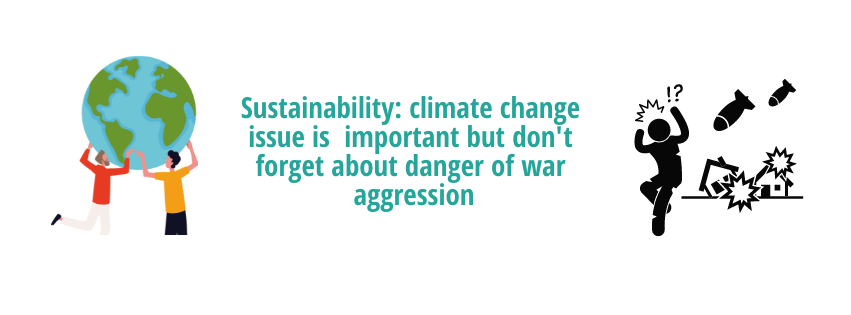
Today the whole world is talking about sustainable development and the role of resilience/climate adaptation in this process - COP27, Proposal for a Corporate Sustainability Reporting EU Directive (CSRD), and a lot of events on the UNECE umbrella regarding Public-Private Partnership for Sustainable Developments Goals. And this is the right direction!
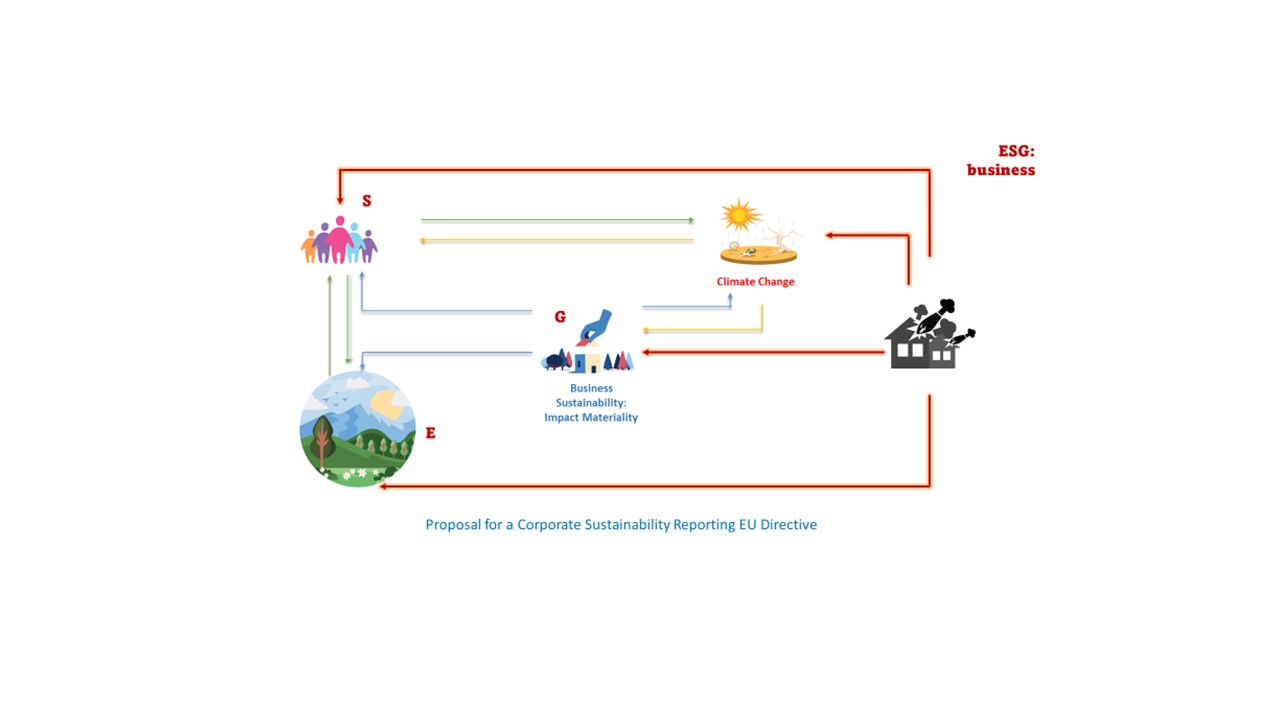
But we do not hear anything about the role of peace in the Sustainable Development and the Green Deal Agenda implementation. Most of respected institutions and experts still avoid talks about wars and their initiators in the context of sustainable development explaining that they are outside of policy. But “wars” and “military aggression” are not about the policy. It is about the crime against people, planet and prosperity! It's about accelerating climate change which could lead to the extinction of humanity!
The war that is now going on in Ukraine has not only destroyed our lives and our infrastructure but has also thrown our country and the world as a whole from their path to sustainable development. This showed that sustainable development is not possible without peace, and peace is possible only when society is sustainable.
The world has taken important steps towards creating a resilient infrastructure that can withstand climate change in order to save people's lives and make them comfortable and safe. But most of this infrastructure cannot be resistant to deliberate destruction by modern weapons. Unfortunately, today the worldview of some people turned out to be more dangerous than natural phenomena! And something has to be done about it.
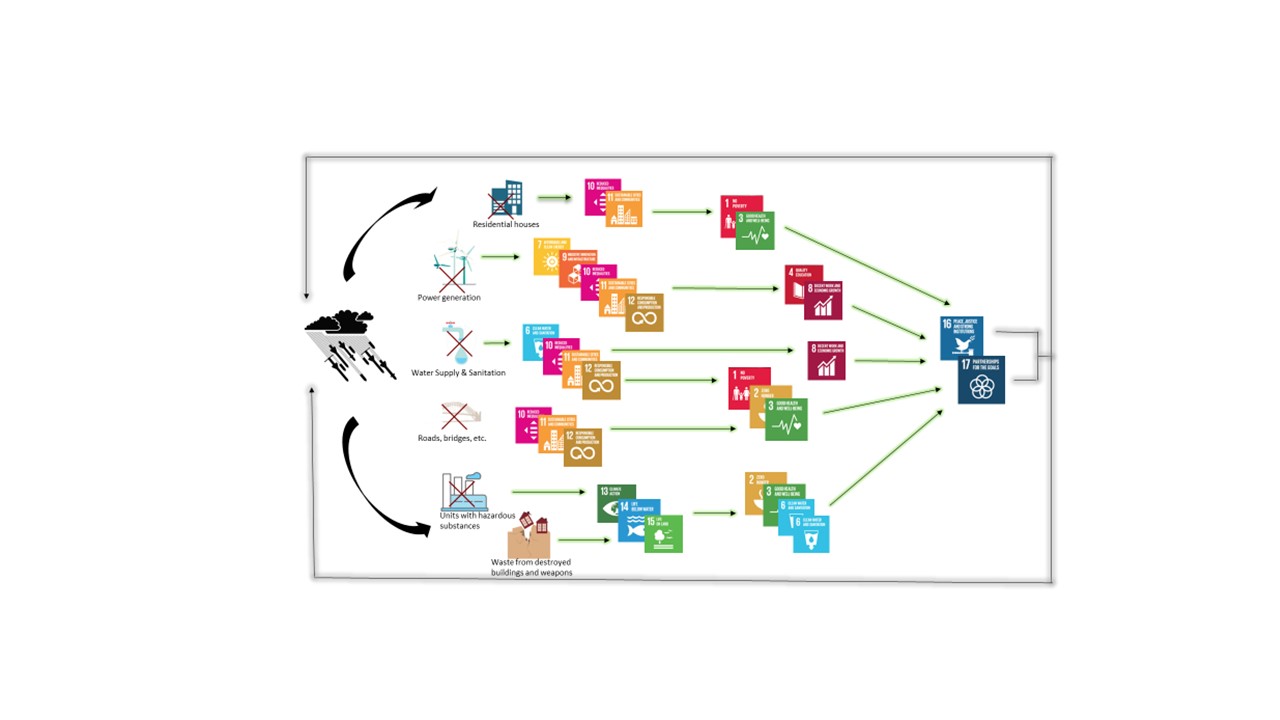
That is why, when thinking about the next version of the SDGs, starting in 2030, it should not be forgotten about such priorities as maintaining peace, the prevention of military aggressions, collective commitments to the total disarmament and ensuring public implacability to any kinds of violence. Otherwise, it will be impossible to move the world forward in sustainable development.
